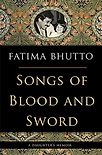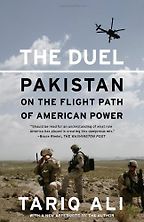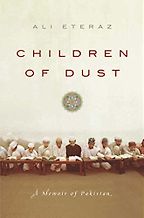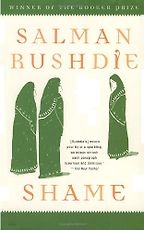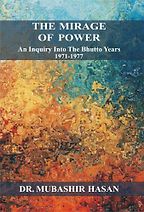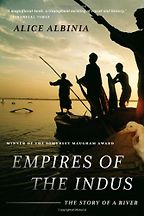Your first book, Tariq Ali’s The Duel, is all about America’s relationship with Pakistan.
They say that there are three forces that determine the direction of Pakistani politics: the army, Allah and America, and I think that is slightly overstated because I am not sure Allah has that much to do with it!
The American involvement in Pakistan goes back almost to the time of the country’s inception. From the 1950s we were already seeing America coming in and involving Pakistan in these South Asian defence pacts and determining the course of the foreign policy of the country. And many people don’t seem to have that awareness of how far back America’s involvement goes, though in Urdu the word that we have for imperialism I find to be particularly telling. It’s samraj—and many people think that literally means ‘the raj of Uncle Sam.’
Those of us who have studied our recent history know what an incredibly devastating role the Americans have played. Tariq Ali is one of Pakistan’s bravest historians and critics. So for him to put out this book is an education in the forces of this country’s foreign policy, its economic history and its character. And this relationship with America is the hidden narrative of Pakistani politics. I mean hidden to the rest of the world.
But increasingly in the global public domain.
Yes, in recent years there has been a lot of talk about the Pakistani intelligence services and why they are a force unto themselves, and to answer that question you really have to go back to the 1980s and look at the role that America played in strengthening those institutions, like the army and the ISI. But if you are really serious about understanding that problem you have to go back even further to America’s history. And I am not just talking about the history of supporting the Pakistani army but the history of supporting every single military dictator that the country has had. Because they have all been America’s allies, and a premier American ally that has benefited with rich economic, defence and military aid. If we look at secular movements in this country they haven’t had the same support.
How do you think American troops leaving Afghanistan will play out in Pakistan?
Well, you know Pakistan has been dragged into this war as the third front and we’ve become the front for the war on terror. We are the launching pad for the American war in Afghanistan, which is a war that most Afghanistanis feel that we have no business participating in. We will believe it when we see it. The Americans are so entrenched we have Richard Holbrooke stepping into the country every month or so just to check in on us and tell us what is democratic and what isn’t and how we should be fighting a war that we have been fighting long before the Americans moved in. So I don’t think people believe very much that the Americans will leave Afghanistan. Of course we saw them leave 20 years ago as well and we all know that they didn’t really leave. The legacy remains, the money remains and the policies remain.
Your next book, Children of Dust by Ali Eteraz, is more about religion and a journey of faith.
I like Children of Dust because I think it is authentic. I think what we see so much with these immigrant stories coming out of Pakistan are these very basic narratives of third world meets the big city and the big continent. There is a crisis of identity and a questioning of their upbringing and then they come back and are completely destroyed as a human being! And that for me is a very one-dimensional way of writing about this experience.
So what I like about this book is that it is an incredibly brave story of that journey. Here is a young man who was brought up in a conservative environment where he attended a madrassa in rural Pakistan and spent his days memorising the Koran and enduring harsh beatings for his mistakes. Then he goes to America and, as one of the reviews put it, there is this amazing sense of religious whiplash. And what I like is that he isn’t afraid to talk about these issues, the sense of shame about what it means to be a Muslim in a foreign country, because he ended up being relocated to Alabama during his adolescence.
He is good at describing this complicated journey and, unlike these obnoxiously popular novels that attempt to condense a migrant’s experience in 150 pages, he really gives you an insight into this world of conservatism. But it is also about resistance to a system and the evolution that he goes through. But that doesn’t mean he has to be one or the other. He is not a rabid fundamentalist or a liberated Westerner. It is about that space in between that he has to traverse through this journey.
Many of us living here think one of the problems with Pakistan is that our history is written for us by foreigners. If you go to any library and look at any history books on Pakistan, or any political books, they all seem to be written by outsiders, by middle-aged white men. And what is so important about Eteraz is that he is perfectly well placed – much more so than a foreign correspondent who has spent two summers in Pakistan – to talk about issues like fundamentalism and disillusionment, and he is able to discuss this evolving religious language that we now use when speaking about Pakistan. We are a country that allows foreigners to speak for us and these are two very important books written by our own.
Your next choice, Salman Rushdie’s novel Shame, is often described as a devastating political satire.
I have personal reasons for choosing this. It is the story of two men, two very powerful men. One is based on my grandfather, Pakistan’s former president and prime minister Zulfikar Ali Bhutto, and the other is based on Muhammad Zia-ul-Haq, who was a military general who overthrew my grandfather and eventually killed him.
In Pakistan we are very quick to condemn Salman Rushdie’s books even if we have never read them and we tend to forget that actually he also has a history in Pakistan. His mother lived in Karachi and he himself spent time in Karachi. You have to remember that the country in the book is fiction but he describes Karachi in fiction like no other fiction writer has done thus far, in the way that he uses language and describes places. And it is a story that Pakistan is all too familiar with – shame and violence and the impact of those two forces.
I think he is incredibly fair to all the parties that he fictionalises, and it is very funny: he says that some men are so great that only they can unmake themselves.
The next book is also about your grandfather: this is The Mirage of Power by Dr Mubashir Hasan.
Yes, this book is also written about that period but is nonfiction and is incredibly important. Dr Mubashir Hasan is a political treasure. He is a founding member of the Pakistan Peoples Party, which is a party that has morphed and mutated tremendously since the 1960s and currently rules Pakistan today in a completely bastardised form. He is a former finance minister, and what I think is so important about The Mirage of Power is that it is about the attempt of a popular government to change the system and their failure to do so and their struggles against the bureaucracy and the military machine of this country.
You have got this wonderful insight into the forces that we still deal with today, like the IMF. The popular government at the time told the IMF that they were not going to pay their debt off on their conditions because they were unfair. Instead they were going to restructure their debt payment in a way that benefited Pakistan. The IMF had no choice but to accept that because they were dealing with a popularly elected government. And when we look at the IMF today and their role in Indonesia or Argentina, and the economic stranglehold they have on the third world, I think this book is an eye-opener into the debt myths of the IMF.
What does it feel like to read books about your grandfather?
Well, he was killed three years before I was born. And the problem of being the granddaughter of such an enormous, almost mythological figure in Pakistan is that nobody wants to tell you anything about him that doesn’t paint him or themselves in a nice light! So, The Mirage of Power was the only chance I had of looking objectively at his policies and at the failures of a government that was incredibly progressive and imaginative in what they wanted for the Pakistani people. It is a legacy that continues until this day. But of course he made mistakes and there were errors along the way. But we have a tendency to lionise our politicians here.
And what about you – when you came to write your latest book, Songs of Blood and Sword, it must have been a difficult task to attempt to write about your father’s flaws?
In the sense that I am writing about people who I knew and loved it is impossible for me to divorce myself from that. There is no such thing as objectivity, is there? But I was critical of certain things that had to be spoken about when it comes to my father and grandfather. As a daughter I can’t be critical because he was a wonderful father. But in the choices that he made with his life it is not only necessary that I am able to look at them with a critical eye but, in terms of this country and my life and my family’s life, it is urgent that I do so. Because if we don’t talk about the mistakes that people have made we are just going to repeat them.
With Zulfikar, who was an extraordinary force of life, so much so he still drives Pakistani politics today, there is nothing disloyal about being critical because it was his mistakes that led to not only his downfall but the change in the Pakistani system. He had an ability to be different in certain periods from other leaders. He sent the army to put down an insurgency in Balochistan and great abuses were committed by that army. So that was an extraordinary failure on his part. And the same is true for my father, when I talk about the choices that he made to confront a military regime by force: it was a decision that changed his life for ever.
Those are not choices that I would make but, living as I do in Pakistan with this stranglehold in politics, it becomes very important to say these are the mistakes made by these men, because if not it means we believe that there is a curse on the family and somehow we are destined for tragedy. I simply don’t believe that. People make mistakes.
Let’s hear about your last book, Empires of the Indus, by Alice Albinia.
I chose this because it beautifully tells the story of this legacy of conquest, of the empires and colonialism and all the politics that go along with that. And also we know that the wars of this century are more than anything else going to be about resources, one of which is water. If you look at South Asia you can see that water is a huge part of that conflict. There is all the flooding in Pakistan today. The Indus is a life force for this country. It is the birthplace of what is now Pakistan. And Albinia’s book starts with Pakistan and follows the Indus all the way up to China and talks about not just the British Raj and its role in destroying the Indus delta but also as far back as Alexander the Great and his conquests and why his conquests were so successful.
Get the weekly Five Books newsletter
During the past two thousand years a series of invaders – Alexander the Great, Afghan sultans, the British Raj – made conquering the Indus valley their quixotic mission. For the people of the river, meanwhile, the Indus valley became a nodal point on the Silk Road, a centre of Sufi pilgrimage and the birthplace of Sikhism. Empires of the Indus follows the river upstream and back in time, taking the reader on a voyage through two thousand miles of geography and more than five millennia of history redolent with contemporary importance.
You are obviously passionate about your country, but with all the unrest in Pakistan are you ever tempted to go and live somewhere else?
Oh, no, because I think if one looks at what is happening in Pakistan today with this position of endemic corruption of the state and the incredible incompetence of this country’s leaders, if I decided to get up and go, or we allow other people to tell our stories or raise our issues, or we are made to be silent, there is no future. But what gives me hope is books like these where people are speaking about this legacy of violence and the corruption of the state. So no, I am here to stay.
Five Books aims to keep its book recommendations and interviews up to date. If you are the interviewee and would like to update your choice of books (or even just what you say about them) please email us at [email protected]
Five Books interviews are expensive to produce. If you've enjoyed this interview, please support us by donating a small amount.

